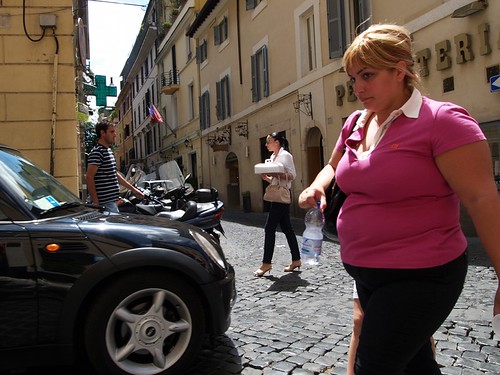Why I like things Italian: the coffee edition
This is the second in a irregular series of articles I plan to post about our trip to Italy this past summer. Although, you might notice, if you read them, that they are as much about urban life here in Vancouver as they are about what I saw and did in Italy. However, if you agree that one of the singular values of travel is what it teaches us about ourselves and where we’re from, then please read on.
In Italy a “coffee” is an espresso. They only call it “espresso” on their sandwich-boards in the most touristic areas. Otherwise, if you ask for “espresso” they might look at you with rolled eyes. They’re probably thinking “what do you *think* this big chrome machine on the counter is for?” That espresso won’t be expensive, either. It should only cost 80 or 90 eurocents as long as you stand up at the bar. If you sit down, particularly in tourist areas, it’ll cost twice as much or more.
An awful lot of North American writing about Italy and Italian coffee is along the lines of “the coffee is way better than what you get at home”, but if you live in Vancouver (or (probably) in the centre of most of the other progressive cities on this continent) your Italian espresso is quite possibly not the best coffee you’ve ever tasted or even close to it. I’m lucky to work in an area with some of the best coffee I’ve ever come across. Two or three of the coffee bars I can walk to from my office will reliably draw for me an espresso that’s better than anything else I’ve tasted.
But, that said, I can see where the travel writers get the idea that Italian coffee is so good. Most of the coffee you can get in downtown Vancouver and which most people seem to be drinking just isn’t that good. The big coffee-chains use beans that are too bitter for a good espresso. I suppose they are optimized for heavy creamy lattes and from what I can tell, that’s what the overwhelming majority of customers order there. Many of the small independent cafe’s I’ve been to are, unfortunately, not turning out very good coffee either. I’ve heard it said that small local cafes are often “$250,000 qualifying- businesses” run by entrepreneur-class immigrants. They may well have a passion for business but not necessarily a passion for drawing a good espresso. I realize I’m tarring these folks with a broad brush but I don’t think the majority of them whose coffee I’ve tasted are dedicated to producing exquisite espresso, and it shows.
So, the coffee impression in Italy isn’t necessarily that it’s the best espresso but it is that very good espresso is not a hit-and-miss proposition and you can get it for cheap. And cheap anything is hard to come by in Italy.
There is also a strong cultural identity in Vancouver and Italy related to the design and atmosphere of cafes, but I’m going to discuss that in a future post about design.
